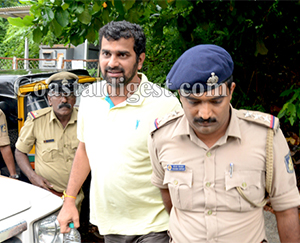Mangaluru, Nov 29: Admitting a special leave petition, the Supreme Court has ordered to issue notice to Naresh Shenoy alias NaMo Naresh, the prime accused in the murder of RTI activist Vinayak Baliga.
Ramachandra Baliga, father of Vinayak Baliga, had filed special leave petition before the Supreme Court challenging a Karnataka High Court order that granted bail to NaMo Shenoy, the leader of Yuva Brigade (erstwhile NaMo Brigade).
High Court advocate N Ravindranath Kamath said that the matter was posted before judges Justice Pinaki Chandra Ghose and Justice U U Lalit in the Supreme Court on Monday.
"Former High Court judge H N Nag Mohandas argued the case on behalf of Ramachandra Baliga. The court went through all the records and issued notices to Naresh Shenoy and the state government. The court also directed us to serve 'Dasti Notice' (serving the notice in person by hand) to Naresh Shenoy. We are taking the Dasti Service and once it is served, the matter will come before the court anytime within next two weeks," Kamath said.
The main contention of Baliga's father is that the investigation into his son's murder case has come to a standstill after Karnataka High Court granting bail to Naresh Shenoy. In his petition, Ramachandra Baliga has pleaded the Supreme Court to cancel the bail granted by the High Court to the main accused. His contention is that the main accused may attempt to tamper evidence when he is on bail, Kamath said.
Narendra Nayak, president of Deshapremi Sanghatanegala Okkuta that supports Baliga's family, said that several questions related to the murder of Vinayak Baliga are yet to be answered.
"Generally, the Supreme Court does not interfere in the bail given by a High Court, but here it is a question of bail been given even as the investigation is going on. I think it is a serious matter. Even as the final chargesheet is yet to be filed, the bail was granted. The family of Baliga and those supporting him are being threatened indirectly. Most of the accused are out of bail in the case. Several questions related to the case remain unanswered," Nayak said.
Vinayak Panduranga Baliga, 51, an electrical contractor and an RTI activist was hacked to death in front of his house in the city on March 21. The High Court had granted bail to Naresh Shenoy on September 15.







Comments
he deserves death penalty
Instead of feeding chicken Biriyani with the tax payers money, better ENCOUNTER ....
Add new comment